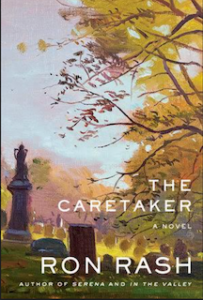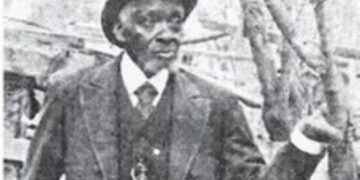Ron Rash, poet, short story writer and novelist, has spent his entire life in his native North Carolina. He was born in Chester in 1953 and grew up in Bowling Green. His family, who have lived in the area since the 17th century, were farmers and factory workers ahead of his father’s generation. Rash identifies with rural life and working class people: “[It’s] . . . the kind of world that I depict and the language of that world as well. And also just being outdoors. . . .” After earning degrees from Gardner-Web and Clemson, Rash began to write and publish poetry and short stories; he also started a teaching career that has continued to the present. Today, he is the John and Dorothy Parris Distinguished Professor of Appalachian Cultural Studies at Western Carolina University, where he teaches courses in poetry and fiction.
Rash began publishing novels in 2002, his first being One Foot in Eden. He has since written seven more novels including his most recent, The Caretaker (2023). In addition, he has published seven collections of short stories and four volumes of poetry. His poetry and short stories have appeared in more than 100 magazines and journals.
Serena, published in 2008, is arguably his most successful novel. The central character is an obsessively ambitious woman, often compared with Lady Macbeth, who is willing to do anything to achieve financial success. Serena also explores Rash’s concern with environmental issues: set in the 1920s in Western Carolina, the novel indicts the lumber industry for raping the land and destroying the lives of rural workers. Serena was a finalist for the PEN/Faulkner Award for Fiction in 2009 and was made into a movie with Bradley Cooper and Jennifer Lawrence. Rash has won other awards including the 2010 Heasley Prize at Lyon College and the Frank O’Connor International short Story Award, presented to him in Dublin, Ireland in 2010.

As with other of Rash’s novels, part of the work focuses on class issues: the desire of later generations of working class Carolinians to rise above the poverty of their ancestors. Jacob’s parents, Daniel and Cora, have achieved financial success and local status, owning both a saw mill and general store in Laurel Fork. The Hamptons, especially the highly ambitious Cora, who somewhat resembles Rash’s Serena, have strong goals for their only surviving child; however, when Jacob meets and elopes with Naomi Clarke, a beautiful but uneducated country girl from Tennessee, his parents, immediately disinherit him.
Jacob’s friend, the caretaker of the title is Blackburn Gant, disfigured by polio in his childhood. As an adult, Blackburn has become the town pariah, working as the caretaker at the local cemetery. Despite his poverty and physical disabilities, Blackburn emerges as the real hero of the novel. When he and Jacob were around ten-years-old, they form a “blood brother” relationship that has continued through the years. When Jacob goes off to Korea, he asks Blackburn to look after his pregnant wife. While fulfilling that promise, Blackburn falls in love with Naomi himself, more deeply when he moves her back to Tennessee after an ugly confrontation with Daniel Hampton on a public street. Claire Fullerton writes of him in the New York Journal of Books:
Blackburn is a man of honor and a trustworthy caretaker in more ways than one. An oath taker with a moral compass, he takes his charge of Naomi seriously and fulfills his duties valiantly until Jacob returns home from the war shell-shocked and damaged, only to find circumstances changed.
Events that occur after Jacob’s return to Laurel Fork transform the novel into something of a thriller with a convoluted plot and considerable suffering for the characters, both existential and moral. Jacob’s parents conceive a devious plan to take advantage of Naomi’s absence from the town, one that will return Jacob to their home with its legacy of wealth and social status.
Written in five sections that almost mirror acts in a Shakespeare tragedy, the drama of the novel rises to a somewhat unexpected conclusion. Along with the story, Rash is especially good with creating believable dialogue. His characters speak the language of their area and era but without exaggeration. Another strength arises from Rash’s reverence for the North Carolina landscape, which he especially imbeds in Blackburn, whose rural background, isolation, and closeness to death and dying give him a special sensitivity to the transcendent beauty of nature. As recent critics have asserted, The Caretaker is one of Rash’s best novels.





























